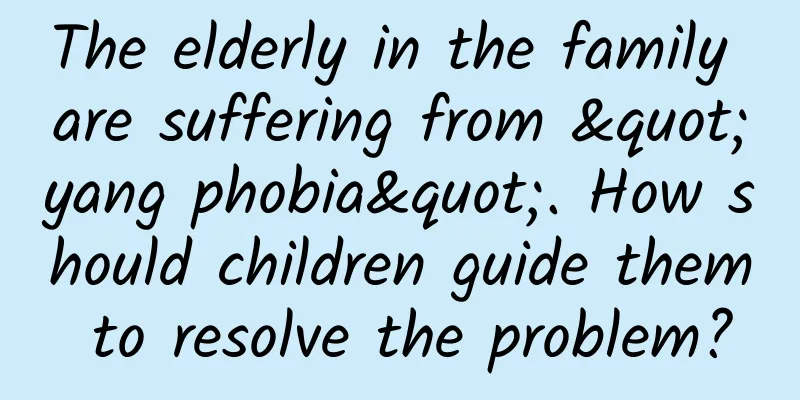The elderly in the family are suffering from "yang phobia". How should children guide them to resolve the problem?

|
Recently, with the optimization and adjustment of epidemic prevention policies, the number of "xiaoyang people" around me has gradually increased. Despite repeated calls from experts, more than 95% of Omicron infections are asymptomatic or mild; If the symptoms are mild or even feverish, there is generally no need to go to the hospital. At present, blindly "hoarding medicines" and crowding for "medical treatment" are still common. Behind this is still the worry and tension about "yang", especially for the elderly who are a high-risk group. They seem to be suffering from "yang phobia syndrome", and begin to feel restless and uneasy, as if on guard. Copyright image, no permission to reprint Why are the elderly particularly prone to "yang phobia"? What are the psychological principles behind it? As children, what kind of psychological support can we provide to the elderly? This article will tell you the answer. 01 Why are the elderly particularly prone to "yang phobia"? Even though the media keeps emphasizing that Omicron is not as toxic and pathogenic as the original coronavirus and Delta virus; However, many elderly people still find it difficult to change their mindset and regard Omicron as a "monster", causing them to become overly anxious. This is mainly because the cognition of the elderly is easily influenced by the "stereotype effect". Three years ago, the scenes at the beginning of the epidemic are still vivid in our minds, so our understanding of the virus cannot be completely changed in the short term. Although the "stereotype effect" is reflected in the entire population, it is indeed more difficult for the elderly to accept new information. Researchers asked more than 700 subjects of different ages to fill out questionnaires and perform simple decision-making tasks: Have them see two boxes with flashing dots and indicate which box contains more flashing dots. Importantly, after participants made their choices, the researchers gave them the opportunity to look at a clearer version of the box before making their final decision. The results found that participants over the age of 60 were more likely to reject useful new information in the experiment, which led to lower accuracy in their final decisions. Copyright image, no permission to reprint This shows that when society's perceptions of the new coronavirus begin to change, the elderly are easily influenced by "stereotypes." Refusing to input new information and thus "failing to keep up" with the pace of change, they stubbornly fear "Omicron" as if it were the first generation of the new coronavirus, which only adds a lot of troubles to their hearts. At the same time, the elderly are also easily deceived by false information on the Internet, exaggerating the dangers of positive Omicron test, leading to anxiety. The older people’s susceptibility to believing “fake news” is determined by their cognitive characteristics. A series of studies have shown that people aged 60 and over lack the digital media literacy necessary to judge the authenticity of online news and cannot easily distinguish between facts and lies on social networks like young people. At the same time, from the perspective of cognitive and social psychology, aging has a negative impact on cognition and memory. The theory is that memory deteriorates with age, making it harder for older people to resist the "illusory reality effect." That is to say, when they are exposed to a certain type of information repeatedly, they are willing to believe that this information is correct. When evaluating the truth, they prefer to judge based on their familiarity rather than rational analysis. That is, the more complex the information environment and the more prevalent the misinformation, the more severe this effect will be. It can be seen from this that the elderly have more time to browse the Internet, and are more likely to be repeatedly exposed to alarmist false information, thus becoming more convinced of information that exaggerates the dangers of "Omicron", leading to an irrational "yang phobia" mentality. Finally, compared with other age groups, the elderly are indeed more concerned about their own health status, which is related to the phenomenon of "end point anxiety". As they gradually approach the end of their lives, many elderly people will have a more serious fear of death and worry about their physical health. Copyright image, no permission to reprint At the same time, cross-cultural studies have shown that influenced by traditional Chinese concepts of death, Chinese elderly people are reluctant to talk about death. But the more we avoid death, the more we increase our fear of death. Compared with Western society, the level of death anxiety among the elderly in my country is higher. From the perspective of caring for life and fearing death, it can also explain why many elderly people in China have stronger anxiety after the implementation of the "New Ten Measures for Epidemic Prevention". 02 The elders at home refused to take "protection" Is it because of stubbornness? In contrast to the "yang phobia" sentiment, another group of elderly people show the characteristics of "over-optimism" - refusing to change their lifestyle habits to cope with the current situation, such as: Continuing to participate in gatherings, playing mahjong, visiting friends, etc., or being very confident in one's physical condition, refusing to wear a mask, and not insisting on washing hands, poses risks to the health of oneself and others. Are elderly people who display a series of “blindly confident” behaviors stubborn because of their stubborn personality? The answer is actually not that simple! There is a famous aging paradox in developmental psychology, which refers to the fact that many elderly people are more optimistic than young adults. It is explained by the positivity effect of old age. Scientists have found that: As they age, the elderly are more susceptible to negative emotions caused by declining physical functions and cognitive abilities. But they will actively adjust, pay attention to stimuli that make them happy, avoid stimuli that make them unhappy, and keep positive emotions at a high level at all times. It’s just that this cognitive style of “focusing more on the positive side” sometimes automatically affects the behavior of the elderly, causing them to ignore risks and do a series of things that disregard their own and others’ health, such as “not wearing masks” and “gathering casually”. As children, once we understand the aging paradox, we need to take better care of our elders at home. Don’t let the elderly overestimate their immune system due to the cognitive bias of “blind confidence” and ignore the importance of daily epidemic prevention. 03 Parents are too anxious How to help him relieve his emotions? When the elders in the family are overly anxious about being "positive", the first priority of their children is to convey scientific and accurate information to them. The less scientific information there is, the more room there is for "brain filling", and the stronger and more lasting the fear of the unknown will be. Therefore, children need to let their elderly parents know the data on the damage caused by diseases to the body and mortality rate released by authoritative organizations to reduce the stigmatization of diseases. Look at more real cases and don’t believe in fake news that is spread on the Internet to attract attention. Copyright image, no permission to reprint In addition, storing knowledge about disease prevention and treatment, preparing medicines appropriately, and coping with physical discomfort, these behaviors that enhance certainty of things will greatly alleviate the anxiety caused by uncertainty. If the elderly are suffering from anxiety for a long time, we can patiently talk to them about the past. Nostalgia is considered a complex emotion that may give people a negative feeling, but it actually has a positive side. Positive nostalgia is especially effective in strengthening social relationships. It can make people feel loved and protected, as if they have returned to a safe time in the past. So when you really don’t know how to comfort your elders, don’t wait for them to say “I held you in my arms when you were a child.” You might as well reminisce with them: "Do you remember how you held me when you were a child?", so that the elders' attention will return from the present to the more stable past, which can help them have a more positive emotional experience. Here is another suggestion that is somewhat "counter-common sense" - letting the elderly help you with housework and take care of children can also improve their immune function. Scientific research shows that this behavior also helps to improve the immunity of the elderly. Recently, a joint study by researchers from Switzerland, Australia and Germany was published in the journal Evolution and Human Behavior. Scientists found that: Compared with those who have not cared for grandchildren or have no children or grandchildren, those who help care for grandchildren have a 33% lower risk of death. Copyright image, no permission to reprint Furthermore, among the elderly group who took the initiative to care for their children and grandchildren, about half of them were still alive in the decade from 1990 to 2000. On the contrary, about half of the elderly who had never taken care of their children or grandchildren died in just five years. Based on this result, the researchers also pointed out that any form of altruistic behavior is helpful in enhancing the immunity of the elderly and prolonging their lifespan. Altruistic behavior is essentially a pro-social behavior. Its most primitive basis is the upbringing of children by parents, and caring for grandchildren is the extension of this primitive pro-social behavior to the next generation. Participating in public altruistic behaviors in the community is a prosocial behavior that goes beyond family blood ties. These prosocial behaviors bring about cooperative support between people and are beneficial to health in themselves. Even if this study cannot conclude that "doing good deeds can prevent COVID-19" for the elderly, as children, properly guiding "yang-phobic" elders to do more altruistic behaviors will indeed help protect their physical and mental health. I hope that by understanding the above psychological knowledge and techniques, I can help everyone get through this special moment smoothly. Protect the physical and mental health of the elderly at home and start a new life full of hope. Author: Tang Yicheng, Chief Editor of Beijing China Science and Technology Mental Health Promotion Center Review | Mao Lihua, Associate Professor, School of Psychology and Cognitive Science, Peking University The cover image and the images in this article are from the copyright library Reproduction of image content is not authorized |
<<: Is AI invincible in fake human voice?
>>: The football field at the end of the world invites you to immerse yourself in the experience →
Recommend
Can "eating dirt" cure enteritis? What kind of weird linkage is this?
Recently, a new research result published in Natu...
One million dollar reward! Is LeEco mobile phone really good?
Lei Jun's words made Liang Jun angry. On the ...
CINNO Research: In the first quarter of 2022, the wholesale sales volume of passenger cars in the Chinese market reached 5.44 million units, an increase of 8.6% year-on-year
Recently, data released by "CINNO Research&q...
Master the user portrait knowledge system from 0 to 1 in one article
I took a course on user portraits some time ago, ...
Support fingerprint unlocking, perfect combination of Email Master and iOS8
Just touch the Home button of your Apple phone wi...
Behind the beautiful and thrilling somersaults, what factors affect the gymnasts' rotation?
In gymnastics competitions, athletes perform some...
Why do you always choose the slowest one in the queue? You may have stepped on the hidden "Law of Bad Luck"
Have you ever had this experience: you see the te...
【Health and Physical Therapy】Five Elements Meridian Yoga Teaching 6 Sessions
【Health and Physical Therapy】Five Elements Meridia...
How much does it cost to be an agent of Jiaxing Building Materials Mini Program? What is the price of Jiaxing building materials mini program agent?
How much does it cost to be an agent for a buildi...
iOS 10 review: 23 major features fully analyzed! Click here for the upgrade tutorial
This is simply unbearable! iOS 10 hands-on experi...
The less bad cholesterol, the better, and the more good cholesterol, the better? In fact, this range is more appropriate!
With the popularization of health knowledge, many...
Ministry of Commerce: Parallel import pilot projects see significant price cuts for mid- to high-end cars
The Ministry of Commerce held a regular press con...
China Association of Automobile Manufacturers: A brief analysis of the sales of key enterprise groups in the automobile industry from January to July 2023
According to statistics and analysis by the China...
Building a brand’s own broadcast account matrix!
On May 25, Douyin’s 618 Good Products Festival en...
Why your short video has no recommendations?
Many people will find out when they start making ...









